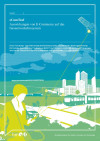eComTraf – Effects of e-commerce on the overall transport system
Short Description
Starting point / motivation
In recent years the Internet has evolved to an important sales channel for retailers. By 2020, up to 60% of the Austrian population is going to buy online at least once a year. In numerous studies this booming e-commerce is seen as a key driver of annual transport capacity of courier service providers.
The increase of internet shopping goes along with changes regarding the performance of private shopping trips. These developments in turn have an impact on the overall transport system. Yet, the existing research papers which examined the interdependencies between personal mobility and e-commerce could not yet provide satisfactory results.
Contents and goals
The aim of the study ecomTraf is to represent interactions between:
- personal mobility and
- e-commerce and its influence on the overall transport system in the form of an impact model
By using this impact model it is possible to show basic cause-and-effect relationships.
Methods
The analysis encompasses the involvement of the following three actors:
- customers – via online survey
- online retailers
- CEP service provider by the advisory board and expert interviews
Results and Conclusions
This comprehensive approach allows the mapping of potential (future) impacts of e-commerce on the traffic:
Impact models have been developed for this. These show that the positive effects of online trade depend heavily on the type of delivery, above all the possibility to combine delivery trips as well as the opportunities for customers to collect parcels in person.
Same-day deliveries and narrow time slots are two of these developments that complicate combined deliveries and either increase the number of trips or reduce the number of parcels per trip. The CEP service providers are therefore required to use innovative concepts and organisational measures to counter act the load factor problem.
On the other hand, neutral parcel stations in the vicinity of housing estates and apartment buildings help to increase the number of parcels per stop and enable the delivery of more parcels in the same amount of time. That increases both the load factor and customer benefit.
If you assume that an online purchase fully substitutes a shop-based purchase, then e-commerce even has a traffic-reducing effect. This is explained by the combined delivery of parcels by the CEP. If same-day delivery - or even 1-hour delivery - and individual delivery time slots gain in importance, this bundling effect is reduced and the effect reversed. The traffic load per parcel then exceeds the distance driven on a personal shopping trip.
Publications
eComTraf - Auswirkungen von E-Commerce auf das Gesamtverkehrssystem

The study ecomTraf analysed the impacts of the relation between consumer needs, the offers of online retailers and the CEP (courier-express-parcel) service industry on the development of the overall transport system.
Mag.(FH) Doris Gierlinger, Dr. Marike Kellermayr-Scheucher, Dr. Oliver Koll, Dr. Maria Kreuzer, Dr. Max Herry, DI Norbert Sedlacek
Publisher: BMVIT
German, 67 Seiten
Publication Downloads
Project Partners
Project manager
Dr. Efrem Lengauer, FH OÖ Forschungs- & Entwicklungs GmbH
Project partners
- DI Norbert SEDLACEK, Herry Consult GmbH
- Dr. Oliver KOLL, Institut für Marketing - Strategieberatung GmbH & Co KG
Contact Address
FH OÖ Forschungs- & Entwicklungs GmbH
Dr. Efrem LENGAUER
Tel.: +43 (0) 50804-33216
E-mail: efrem.lengauer@fh-steyr.at
Web: www.logistikum.at
